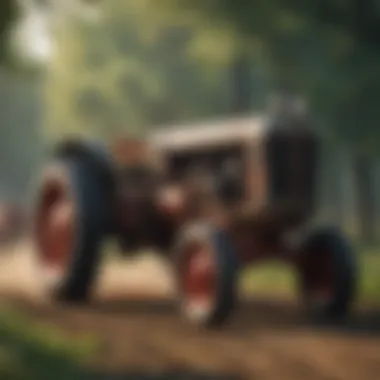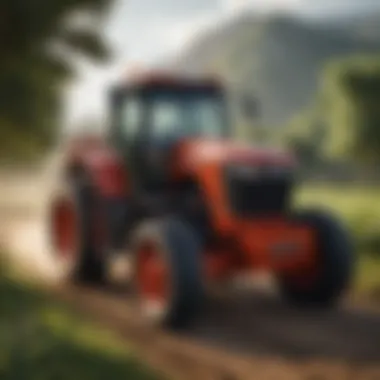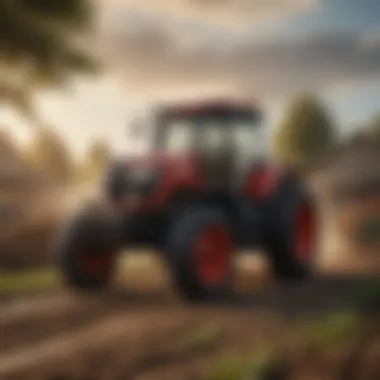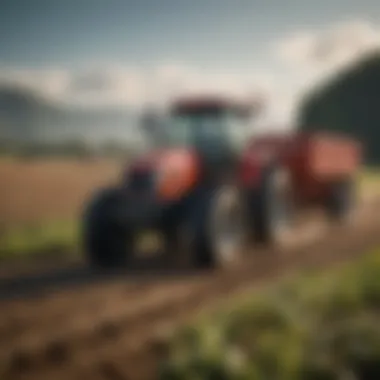Mordt Tractors: Exploring Innovation in Agriculture


Intro
Mordt tractors hold a significant place in agricultural history and modern farming practices. These machines have evolved to meet the demanding needs of farmers, improving productivity and efficiency in various agricultural settings. Understanding Mordt tractors involves grasping their historical context, design features, and the practical applications that make them essential in today’s farming landscape.
The exploration of Mordt tractors covers a range of key areas. From their unique design characteristics to the role they play in enhancing farming efficiency, every aspect sheds light on their importance. This article is tailored for those who are passionate about agriculture, whether they are professionals in the field or enthusiasts curious about the technologies driving modern farming.
Key Concepts and Terminology
Definition of Terms
Before diving deeper, it is crucial to define some terms related to Mordt tractors.
- Tractor: A vehicle designed primarily for pulling loads, especially in agricultural contexts.
- Hydraulics: A system that uses liquid to transmit power, essential in operating various tractor functions.
- PTO (Power Take-Off): A mechanism used to transfer power from the tractor to other equipment.
Overview of Relevant Practices
Mordt tractors have been integrated into various agricultural practices. These include:
- Plowing: Preparing soil for planting.
- Sowing: Planting seeds in the ground.
- Harvesting: Collecting mature crops from the fields.
Understanding these practices is essential to appreciating how Mordt tractors enhance agricultural productivity.
Current Trends and Innovations
Latest Research and Developments
Technological advancements are constantly reshaping the farming landscape. Mordt tractors are not exempt from these trends. Recent research focuses on improving fuel efficiency and sustainability in tractor operations. The integration of GPS technology is becoming standard, allowing for precision farming that can boost yields and reduce waste.
Emerging Technologies and Tools
The advent of smart tools and software aids in farm management. Mobile applications for tracking tractor performance and scheduling maintenance are increasingly popular. These tools provide farmers with valuable insights, enabling effective decision-making and resource allocation.
Practical Applications
Step-by-Step Guides
When utilizing Mordt tractors, farmers can benefit from clear, actionable guides:
- Starting the Tractor: Ensure all safety checks are complete and start the engine.
- Setting the Implements: Attach the desired equipment for the task at hand.
- Adjusting the Settings: Configure the speed and depth settings as required.
Troubleshooting Common Issues
Farmers sometimes encounter challenges with their Mordt tractors. Common issues may include:
- Engine Starting Problems: Check the fuel level and battery connection.
- Hydraulic Failures: Inspect hydraulic lines for leaks or damage.
- PTO Malfunctions: Ensure that the PTO is engaged properly.
Proper maintenance of these machines is crucial for their longevity and efficiency.
This detailed understanding of Mordt tractors in agricultural contexts highlights their continued relevance. By incorporating the latest technology and practices, these tractors are pivotal in shaping the future of farming.
Preamble to Mordt Tractors
Understanding Mordt Tractors serves as a foundational aspect of this article, as it sets the stage for a comprehensive exploration of their significance in agriculture. These machines are not merely tools; they are pivotal in transforming the agricultural landscape and enhancing productivity. For farmers and agriculture enthusiasts, knowledge about these tractors is crucial, as it can inform purchasing decisions and operational strategies.
Mordt Tractors embody innovation and efficiency, reflecting not only technological advancements but also a commitment to meeting the evolving needs in agricultural practices. The evolution of these tractors mirrors changes in farming methodologies, showcasing the importance of adaptability in this sector. The continuous development of tractor technology has direct implications for yield efficiency, labor requirements, and even sustainability in farming. The exploration of Mordt Tractors will delve into their defining characteristics, historical context, and how they integrate into modern agricultural settings.
Defining Mordt Tractors


Mordt Tractors are distinguished by their robust construction and versatility. They are designed to handle various tasks in farming, from tilling the soil to transporting goods. One key feature is their powerful engines, which provide essential torque for demanding operations. Moreover, Mordt Tractors come equipped with advanced hydraulic systems, enhancing their capabilities to attach a myriad of implements, such as plows and seeders.
Their design emphasizes ease of access and control for operators, ensuring that even those with limited experience feel comfortable managing these machines. When assessing the functionality of Mordt Tractors, it is also crucial to consider aspects like fuel efficiency and maintenance requirements. Users appreciate models that minimize downtime and reduce operational costs. Thus, when defining Mordt Tractors, it is important to acknowledge their integral role in promoting effective farming practices.
Historical Context
To appreciate the significance of Mordt Tractors, it is beneficial to understand their historical roots. The development of tractors was influenced by the agricultural revolution, which sought to improve farming efficiency. Early tractors were basic and primarily derived from steam engines, but advancements led to the introduction of gasoline and diesel variants.
Mordt Tractors emerged during a time of rapid technological change in the mid-20th century. Here, they adapted to various farming needs and incorporated features that addressed specific regional agricultural challenges. This context allows a deeper understanding of how Mordt has positioned itself in the market.
Gradually, the brand evolved to include models suited for different scales of farming, from small plots to large agricultural enterprises. The historical evolution reveals ongoing trends such as mechanization and automation, influencing not just Mordt but the entire tractor industry.
Evolution of Tractors
The evolution of tractors is a pivotal theme in understanding the development of agricultural efficiency. As farming practices have transformed, so too have the machinery and tools used to cultivate crops. This section provides insight into significant changes in tractor technology and their broader implications in the agricultural sector. By examining the transition from steam-powered machines to modern diesel engines, we reveal how technological advancements not only enhanced productivity but also addressed the diverse needs of farmers.
From Steam to Diesel
The journey from steam-powered tractors to diesel engines marks a substantial shift in efficiency and operational capability. Steam tractors were some of the earliest forms of mechanized farming equipment. They offered improvements in power compared to horse-drawn implements, yet they came with notable drawbacks. Steam engines required considerable time for preparation, including water and fuel management, which impacted their practical usage in the field.
With the advent of internal combustion engines, particularly diesel, the agricultural landscape began to change dramatically. Diesel tractors provided several advantages:
- Improved Efficiency: Diesel engines are known for their fuel efficiency, meaning farmers can operate for longer periods without refueling.
- Simplified Operation: Compared to steam tractors, diesel models don't rely on boiler systems. This simplified usage made it easier for farmers to adopt new tractor technologies without extensive training.
- Greater Power-to-Weight Ratio: Diesel tractors can produce more torque and horsepower relative to their weight, allowing them to perform better on various terrains and tasks.
The transition to diesel not only improved the tractors themselves but also had a ripple effect on farming practices, allowing for larger fields and more intensive crop management.
Technological Advancements
Technological advancements in tractor design and functionality have continued to shape the future of agriculture. Modern tractors incorporate a range of innovations that enhance performance, safety, and user experience. Key developments include:
- GPS and Precision Farming: Modern tractors often come equipped with GPS technologies, enabling precise navigation and reduced overlap when planting and harvesting. Such precision reduces waste and maximizes yield.
- Automation and Smart Farming: The integration of automated functions is becoming standard in new tractor models. These features can handle tasks such as sowing, plowing, and monitoring soil health with minimal human intervention.
- Eco-Friendly Solutions: As sustainability becomes ever more critical, many tractors are designed to run on alternative fuels and minimize emissions. This focus on environmental benefits aligns with global initiatives aimed at reducing agriculture's carbon footprint.
- Enhanced Comfort and Usability: Today's tractors feature ergonomic design elements such as comfortable seating, intuitive controls, and climate regulation systems, improving the overall operator experience.
"Emerging tractor technologies redefine how farmers approach cultivation, blending efficiency with sustainability."
In summary, the evolution from steam to diesel engines and the incorporation of advanced technologies represents a significant transformation in agriculture. Understanding these changes is essential for recognizing the trajectory of farming practices and the capabilities of today's tractors.
Design and Features of Mordt Tractors
The design and features of Mordt tractors play a crucial role in their functionality and usability in agricultural settings. These aspects dictate how efficiently the machinery operates and how comfortable it is for users during extended periods of operation. Understanding the core specifications, ergonomics, and durability of Mordt tractors allows farmers and agricultural enthusiasts to make informed decisions regarding their investments in these machines.
Core Specifications
The core specifications of Mordt tractors encompass the technical characteristics that determine their performance. Key elements include engine power, hydraulic capabilities, and weight distribution. The engine power, often measured in horsepower, varies based on the model and is tailored to suit different farming tasks. This power is critical for tasks such as plowing, tilling, and pulling implements.
Another important specification is the hydraulic system, which affects how effectively attachments can be controlled. High-capacity hydraulics allow for smoother operation of various tools and implements, enhancing productivity in the field. Weight distribution is also significant; optimal balance improves stability and traction, particularly on uneven terrain. This combination of specifications ensures that farmers can execute diverse operational requirements efficiently.
Ergonomics and User-Friendliness
Ergonomics and user-friendliness are vital considerations in the design of Mordt tractors. Comfort during operation is essential, especially for tasks that demand long hours of work. The layout of controls, seat design, and visibility from the operator's position contribute to overall user experience.
Mordt tractors often feature adjustable seats and steering systems, allowing operators to find a comfortable position. The control layout is designed to minimize hand and arm strain, which reduces fatigue during extended use. Furthermore, large windows offer good visibility, mitigating blind spots and improving safety on the field.
These ergonomic features not only enhance comfort but also improve efficiency. Farmers can focus on their work without being distracted by discomfort, leading to better productivity.
Durability and Reliability
Durability and reliability are paramount traits of Mordt tractors. These machines operate under strenuous conditions and must withstand wear and tear from daily use. Mordt tractors are constructed from high-quality materials that resist corrosion, increasing their lifespan.
The reliability of a tractor affects not just its performance, but also the farmer's peace of mind. A durable tractor is less likely to experience unexpected breakdowns, which can disrupt operations and lead to financial losses. Periodic maintenance is simplified due to accessible components, ensuring that farmers can keep their equipment in optimal condition.


"Investing in a durable tractor reduces the long-term costs associated with repairs and downtime."
By prioritizing durability and reliability in design, Mordt tractors stand as dependable choices for modern agricultural practices. These aspects are key to their appeal and long-term satisfaction among users.
Applications in Agriculture
The use of Mordt tractors in agricultural settings is transformative. They redefine how farming operations are conducted. Their applications extend beyond mere land cultivation. These tractors serve as essential tools for various farming tasks.
Field Operations
Field operations are critical to successful farming. Mordt tractors excel in this area by facilitating tasks such as plowing, tilling, and harvesting. Their powerful engines allow farmers to cover vast areas quickly and efficiently. This efficiency saves time and labor, which are valuable resources in agriculture.
Farmers appreciate the robustness of these tractors. They can work in diverse conditions, from dry fields to muddy terrains. This versatility helps farmers to meet seasonal demands efficiently. The ability to adapt to different tasks enhances productivity, resulting in increased yields.
Crop Management
Effective crop management is essential for maximizing production. Mordt tractors contribute significantly to this process. They enable precise seed placement and efficient irrigation practices. The technology in Mordt tractors supports accurate monitoring of soil conditions. This data allows farmers to make informed decisions about crop care.
Farmers find that using these tractors reduces crop wastage. The machinery's design promotes optimal spacing and depth for planting seeds. Furthermore, the tractors can integrate with modern farming technology. This integration leads to enhanced surveillance and management of crops, ensuring better growth and quality.
Pest Control Integration
Integrating pest control into farming practices is crucial for protecting crops. Mordt tractors provide innovative solutions for this challenge. These machines are compatible with various pest control equipment. This allows farmers to apply pesticides or herbicides more effectively and efficiently.
The design of Mordt tractors allows for controlled application rates. This ensures that pests are targeted without harming beneficial insects or plants. It minimizes the environmental impact and promotes sustainable farming practices. Farmers notice a reduction in pest-related losses, directly translating to improved harvests.
"Mordt tractors enable us to manage our fields more effectively. The reduction in pests and increase in crop quality is noticeable."
Economic Impact of Mordt Tractors
The economic influence of Mordt tractors extends well beyond the individual farm. Their design, efficiency, and application significantly affect agricultural profitability and sustainability. Understanding this impact requires a closer look at two specific aspects: the cost-benefit analysis for farmers and the return on investment. Evaluating these elements provides insights into why Mordt tractors are a wise choice for modern agriculture.
Cost-Benefit Analysis for Farmers
When farmers consider purchasing Mordt tractors, they often perform a cost-benefit analysis to measure potential financial returns against the investment. This analysis typically encompasses various factors:
- Initial Investment: The price of the tractor itself is a fundamental element. Mordt tractors are known for their competitive pricing within the market.
- Operational Costs: Maintenance, fuel efficiency, and the cost of repairs also factor into the overall expenditure. Mordt tractors are engineered to be fuel-efficient, potentially reducing running costs over time.
- Labor Efficiency: The efficiency of Mordt tractors allows farmers to complete work faster. This increased productivity can translate into more harvest time and, ultimately, greater yields.
Farmers analyzing these factors might conclude the initial cost is justified by long-term savings and productivity gains. In cases where time is money, the efficiency of these tractors becomes even more critical.
Return on Investment
The return on investment for Mordt tractors can be measured in various ways, making it a significant aspect to consider:
- Increased Yields: Efficient machinery like Mordt tractors can enhance crop performance due to timely planting and harvesting.
- Labor Savings: With improved functionality, fewer labor hours are needed, thus lowering overall wage costs.
- Market Competitiveness: Utilizing advanced machinery can improve a farmer's position in the market by allowing for more efficiency and better quality output.
User Experiences and Feedback
User experiences and feedback play a crucial role in evaluating the real-world performance of Mordt tractors. Insights from actual users provide valuable information that manufacturers and potential buyers can benefit from. The subjective nature of these experiences offers deep understanding beyond mere specifications, highlighting practical applications or limitations in everyday use.
Real feedback from farmers about Mordt tractors can shed light on their reliability and efficiency. Farmers interact with these machines daily, meaning their perspectives reflect various operational contexts. They consider aspects like ease of use, maintenance requirements, and overall satisfaction.
Furthermore, user experiences highlight trends in tractor performance based on real usage scenarios. Knowing how these machines perform in different weather conditions or crop types helps inform purchasing decisions. By collecting this feedback, Mordt can make incremental improvements to its designs, adapting to user needs more effectively.
Interviews with Farmers
Interviews with farmers reveal first-hand experiences, serving as a primary resource for assessing the effectiveness of Mordt tractors. These discussions often cover several themes. Generally, farmers mention operational efficiency, where they assess the time and resources saved by using these tractors compared to older models.


Additionally, farmers provide insights into specific features they find useful. For instance, they may discuss the ease of navigating rough terrain or the effectiveness of the tractor in various field tasks. Here's a summary of common points from interviews:
- Efficiency in Operations: Many express how Mordt tractors reduce the time needed for planting or harvesting.
- Comfort: Farmers appreciate ergonomic designs, which minimize fatigue during long working hours.
- Support and Servicing: Feedback often includes comments on the availability of spare parts and customer service support, crucial for minimizing downtime.
Such interviews not only inform potential buyers but also indicate areas where improvements are necessary.
Common Challenges and Solutions
Like any machinery, Mordt tractors have their challenges. Identifying these common issues can lead to innovative solutions, further solidifying user trust and satisfaction. Some challenges noted by farmers include technical malfunctions and learning curves associated with advanced features.
To address these challenges, users often suggest several approaches:
- Regular Maintenance Routines: Implementing strict maintenance schedules can prolong equipment life and reduce unexpected breakdowns. Farmers emphasize the importance of regular checks and timely servicing.
- Training Programs: Farmers benefit from hands-on training when new technology is introduced, which can ease the transition and optimize machine use.
- Community Feedback Forums: Engaging with fellow users through online communities like Reddit allows farmers to share tips and troubleshooting methods, promoting shared learning.
In summary, user experiences and feedback are crucial in the continuous development of Mordt tractors. Through practical insights from interviews and addressing common challenges, the conversation enhances the relationship between users and the manufacturer. This feedback loop fosters innovation and adaptation in the agricultural sector.
Future Trends in Tractor Technology
The landscape of tractor technology is rapidly transforming. Understanding future trends is essential for anyone involved in agriculture, especially stakeholders aiming to enhance farm productivity and sustainability. Innovations are shaping how tractors operate, making them more efficient, eco-friendly, and user-centric. These advancements will likely determine the success of modern agriculture in meeting global food demands, addressing environmental changes, and improving farmer livelihoods.
Emphasis on Sustainability
Sustainability is at the forefront of agricultural advancements. Modern tractors now incorporate features that reduce carbon emissions and conserve resources. For instance, manufacturers are focusing on biofuel compatibility, which allows tractors to operate on alternative energy sources, minimizing the dependency on fossil fuels.
Furthermore, precision farming is becoming critical. Tractors equipped with GPS and sensor technology enable targeted interventions, reducing excess use of fertilizers and pesticides. This method not only benefits the environment but also leads to cost savings for farmers.
- Benefits of sustainable tractor technology:
- Reduced environmental footprint
- Lower operational costs
- Enhanced soil health
The integration of sustainable practices in tractor design and usage represents a significant step toward a more responsible, eco-conscious agricultural industry. Farmers who adopt these technologies can position themselves as stewards of the environment while enhancing their operational efficiency.
Innovation and Smart Farming
Another major area driving the future of tractor technology is the wave of innovation surrounding smart farming. This trend focuses on integrating advanced technologies into farming practices. Smart tractors are equipped with sensors, AI, and IoT capabilities that provide real-time data about soil health, crop conditions, and machinery performance.
- Key innovations include:
- Automated driving systems that increase precision and reduce labor costs
- Data analytics tools that help in making informed decisions about planting and harvesting
- Remote monitoring systems that allow farmers to supervise tractor operations from afar
These innovations not only streamline agricultural processes but also enhance productivity. The result is a farm that is better equipped to handle the challenges posed by climate change and population growth.
"The future of agriculture heavily relies on adopting smart farming technologies to ensure efficiency and sustainability."
Looking ahead, the marriage of sustainability with innovation will dictate the operational frameworks of farming machinery like Mordt tractors. Emphasizing these core trends is vital for ensuring that agricultural practices can adapt to future demands and environmental challenges.
Culmination
The conclusion serves as a pivotal element in this article, reinforcing the importance of Mordt tractors among modern agricultural practices. Such equipment has transformed the farming sector in numerous ways, providing significant advancements over antiquated methods. Understanding the impact of these tractors goes beyond mere specifications; it touches on the heart of agricultural productivity and efficiency.
Summarizing Key Points
In summarizing the key points of this exploration, we must focus on several standout features about Mordt tractors:
- Historical Significance: These tractors represent a major leap in agricultural technology, evolving from basic machinery to sophisticated tools essential for contemporary farming.
- Design Innovations: Innovations in design ensure that the tractors meet the ergonomic needs of users, making tasks easier and safer, which is critical for long working hours in the fields.
- Economic Impact: The cost benefits associated with utilizing Mordt tractors offer farmers improved returns, enhancing their overall operational efficiency.
- User Experiences: Insights collected through farmer interviews reveal both satisfaction and challenges, creating an understanding of practical use cases.
Understanding these elements helps in appreciating how Mordt tractors are not just machines but vital partners in the agricultural landscape.
Looking Ahead
Looking into the future, the trajectory of tractor technology is poised for further transformation. Here are some considerations:
- Sustainability: The agricultural sector faces increasing pressure to adopt sustainable practices. Innovations in Mordt tractor technology may incorporate environmentally friendly alternatives, such as electric or hybrid engines.
- Smart Farming Integration: The integration of smart technology within tractors promises to revolutionize efficiency. Features like GPS, automated steering, and data analytics are becoming essential for modern farming, indicating where Mordt tractors will need to adapt.
- Customization and Modularity: Future trends may also incline toward customizable features that allow farmers to tailor tractors to specific tasks, enhancing versatility and functionality.
As trends evolve, it is critical for stakeholders to stay updated on upcoming developments and innovations. Understanding and adapting to these changes is essential for maintaining competitiveness in the agricultural field.







